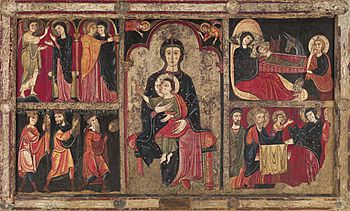Altar frontal from Avià facts for kids
Quick facts for kids Altar frontal from Avià |
|
|---|---|
 |
|
| Artist | Unknown |
| Year | 13th century |
| Medium | Tempera on wood |
| Dimensions | 107 cm × 177 cm (42 in × 70 in) |
| Location | Museu Nacional d'Art de Catalunya, Barcelona |
The Altar frontal from Avià is a very special piece of art from the Romanesque period. It's the decorated front part of an altar that was once in a church. You can see this amazing artwork at the National Art Museum of Catalonia in Barcelona, Spain. It was made a long time ago, in the 13th century, by an artist whose name we don't know.
Contents
What is the Altar Frontal?
This altar frontal used to be in the church of St. Mary of Avià. That's a small town in the Berguedà region. Today, the original frontal is kept safe in the National Art Museum of Catalonia (MNAC) in Barcelona. The church in Avià now has a copy so people can still see what it looked like in its original home.
How Was It Made?
The Altar frontal from Avià was painted using a technique called tempera. This means the colors were mixed with egg yolk, which helped them stick to the wood panel. The artist also used thin pieces of parchment (treated animal skin) to add details.
Special Decorations
The frontal also has special raised decorations called pastiglia. This is a type of stucco (a fine plaster) that was shaped to create a relief effect, making parts of the artwork stand out. There were also metal plates on it once, but these have disappeared over time.
What Does It Show?
The frontal is divided into five main parts. The biggest and most important part in the middle shows the Virgin Mary holding the Child Jesus. These figures look long and thin, and they stand facing forward. This style is often seen in Byzantine art, which influenced many artists during the Romanesque period.
Stories from the Bible
Around the central figures, there are four different scenes. These scenes tell stories from the Bible about the life of Jesus:
- The Annunciation and Visitation: This shows the angel Gabriel telling Mary she will have a baby, and Mary visiting her cousin Elizabeth.
- The Nativity: This scene shows the birth of Jesus.
- The Epiphany: This is when the Three Wise Men (Magi) visit Jesus.
- The Presentation of Jesus in the temple: This shows Mary and Joseph taking baby Jesus to the temple.
The Frame and Details
The edges of the frontal and the lines that divide the different scenes are also beautifully decorated. They are covered with gilded gypsum plaster. This means the plaster was painted to look like precious metal, adding a shiny, rich look to the artwork.
See also
 In Spanish: Frontal de Avià para niños
In Spanish: Frontal de Avià para niños
 | William M. Jackson |
 | Juan E. Gilbert |
 | Neil deGrasse Tyson |

